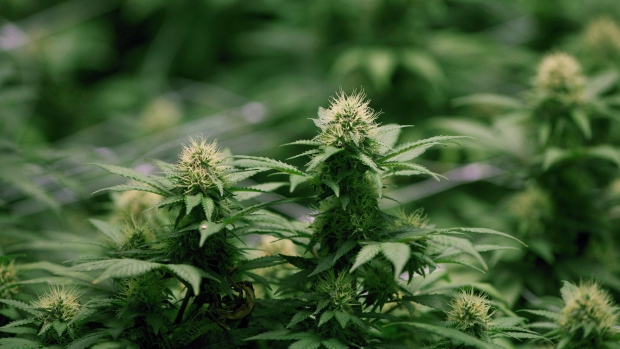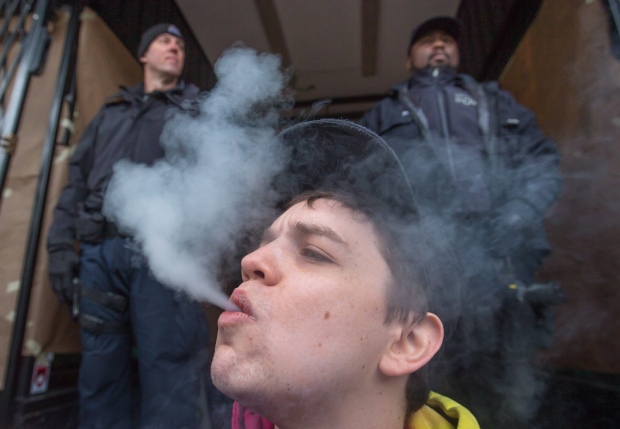Cannabis curious? Jonesing for your first legal joint? Either way, get ready to roll: Prime Minister Justin Trudeau says marijuana will be legal by next summer.
Bill C-45, which will legalize cannabis across the country, largely leaves it up to the provinces and territories to determine how marijuana can be sold and used. Below, we take a look at the current state of these pot policies.
Some things to consider:
Ontario is the only province that has passed its marijuana law. Other provinces and territories are in various stages of completing theirs, so much of the below information is subject to change. Saskatchewan and Nunavut have been excluded from our reefer roundup as both have yet to unveil even partial pot plans.
In every province and territory, the federally-mandated public possession limit of 30 grams of dried cannabis has been maintained, though some provinces, like Quebec and Alberta, will permit you to keep more at home.
With the exception of Manitoba, all jurisdictions have opted to keep their legal dope-smoking ages in line with those for drinking alcohol.
Bill C-45 allows individuals to grow up to four marijuana plants, though some provinces, like Manitoba and Quebec, plan to ban home cultivation.
Provincial and territorial plans vary widely on whether you’ll be able to smoke in public.
Provinces and territories also differ on whether pot shops will be publicly or privately owned. For those opting for publicly-owned stores, these will be operated by provincial Crown corporations that sell liquor. In some cases, provinces have even created subsidiaries of these companies with names like CannabisNB and the Ontario Cannabis Retail Corporation. Unless otherwise noted, these will be standalone stores wholly separate from those that sell alcohol.
After our jurisdictional breakdown, keep reading. We’ll also attempt to peer through the haze at the biggest issues still facing marijuana legalization: namely, testing drivers for impairment, weed in the workplace, smoking in rental properties and the availability of edible products.
ALBERTA
Age: 18+
Where to buy: Privately-run storefronts plus government-operated online sales.
Grow your own?: Up to four plants. Outdoor growing will be banned.
Where to smoke?: Only where tobacco may be smoked.
Other notes: No possession limits in private residences.
BRITISH COLUMBIA
Age: 19+
Where to buy: Both government and privately-run storefronts and online sales.
Grow your own?: To be determined.
Where to smoke?: Only where tobacco may be smoked.
Other notes: More details are expected in early 2018.
MANITOBA
Age: 19+
Where to buy: Privately-run storefronts and online sales.
Grow your own?: Not permitted.
Where to smoke?: To be determined.
Other notes: Legal age is one year above the legal drinking age. Municipalities will be able to hold referendums to ban retail stores.
NEW BRUNSWICK
Age: 19+
Where to buy: Government-operated storefronts and online sales.
Grow your own?: Up to four plants.
Where to smoke?: Only on private property and in private residences.
Other notes: 20 cannabis stores will be open in July. No possession limits in private residences. All cannabis must be securely locked up at home.
NEWFOUNDLAND AND LABRADOR
Age: 19+
Where to buy: Privately-run storefronts plus government-operated online sales.
Grow your own?: To be determined.
Where to smoke?: Only on private property and in private residences.
Other notes: Government-run liquor stores will sell cannabis in some smaller municipalities. Private online sales may be permitted in the future.
NORTHWEST TERRITORIES
Age: 19+
Where to buy: Privately-run liquor stores and government-operated online sales
Grow your own?: Up to four plants.
Where to smoke?: On private property and in private residences. Smoking will also be allowed on trails, highways, streets, roads and in parks when they are not in use for public events.
Other notes: Cannabis will initially be sold through liquor stores. Individual communities will be able to enact cannabis restrictions and/or prohibitions. Landlords will also be able to declare their properties smoke-free.
NOVA SCOTIA
Age: 19+
Where to buy: Government-operated storefronts and online sales.
Grow your own?: Up to four plants.
Where to smoke?: To be determined.
Other notes: Cannabis will be sold alongside alcohol in provincial liquor stores.
ONTARIO
Age: 19+
Where to buy: Government-operated storefronts and online sales.
Grow your own?: Up to four plants.
Where to smoke?: Only on private property and in private residences.
Other notes: 40 cannabis stores will be open in July. 150 will be in operation by 2020.
PRINCE EDWARD ISLAND
Age: 19+
Where to buy: Government-operated storefronts and online sales.
Grow your own?: To be determined.
Where to smoke?: Only on private property and in private residences.
Other notes: More details are expected in early 2018.
QUEBEC
Age: 18+
Where to buy: Government-operated storefronts and online sales.
Grow your own?: Not permitted.
Where to smoke?: Only where tobacco may be smoked, with the exception of university and CEGEP campuses.
Other notes: 15 cannabis stores will be open in July. 150 will be in operation by 2020. Users will be able to keep up to 150 grams at home.
YUKON
Age: 19+
Where to buy: Government-operated storefronts and online sales.
Grow your own?: Up to four plants.
Where to smoke?: Only on private property and in private residences.
Other notes: At least one cannabis store to be opened in Whitehorse in July. Private retailers may be allowed in the future. Landlords will be able to ban marijuana use.
IMPAIRED DRIVING
- There is currently no government-approved roadside testing technology for marijuana impairment.
- According to a recent Health Canada survey, there is also currently no consensus on how long it takes to be able to drive safely after consuming cannabis.
- Experts say roadside urine and blood tests are not useful ways to test drivers for impairment because regular marijuana users can yield positive results days — or even weeks — after use.
- Currently, specially-trained police “Drug Recognition Experts” (DREs) use a 12-step system to detect drug impairment in drivers, including examining one’s eyes, attention, blood pressure and pulse.
- While the Supreme Court of Canada has ruled that DREs can be used for expert evidence in trials, critics have decried the subjective nature of their evaluations.
- The RCMP, in conjunction with other Canadian police departments and Public Safety Canada, has recently experimented with roadside saliva tests. While these have proven to successfully test for the presence of marijuana in a driver’s system within several hours of use, they cannot quantify a driver’s level of impairment the way roadside alcohol tests do. It is thus feasible for a driver to fail a roadside saliva test despite not being impaired. A recent University of Calgary study, moreover, shows that it’s also possible to fail a roadside saliva test after inhaling second-hand marijuana smoke.
- Regarding drug-impaired driving, some provinces are opting to err on the side of caution. Quebec, for example, has proposed a zero-tolerance policy that allows police to arrest anyone who fails a roadside saliva test and immediately suspend their license for 90 days. Ontario will also be enforcing a similar zero-tolerance policy for commercial drivers and drivers 21 and under while simultaneously beefing up existing fines and penalties for non-novice drivers over the age of 21.
- Once cannabis becomes legal, police forces across the country will likely be utilizing roadside saliva tests before moving onto assessments by DREs to determine if a driver is impaired.
WEED AT WORK
- Employers have expressed concern that marijuana legalization will lead to impairment, lower productivity, poor attendance and safety issues in the workplace.
- An even bigger grey area is whether employers will legally be able to test, discipline or even fire workers for using a substance that is legal.
- Business groups are hoping that provincial legislation clarifies both employer and employee rights regarding marijuana.
REEFER IN RENTALS
- It remains unclear if landlords will be able to prohibit tenants from smoking marijuana in rental properties.
- Landlords are also concerned about tenants growing marijuana, which could lead to increased electricity usage and the spread of damaging mould.
- Real estate lawyers are currently looking to tobacco-smoking rules for guidance. While landlords cannot retroactively prohibit smoking tobacco in rental units, they can include such restrictions in new leases. It is unclear if such existing restrictions will be applicable to marijuana once it becomes legal. Landlords are also currently able to take action on cigarette smoking if migrating smoke bothers others in a property. Court rulings regarding such cases, however, have been inconsistent.
- Saskatchewan, Yukon and the Northwest Territories have proposed laws that would allow landlords to ban using marijuana on their properties. Only time will tell if courts will offer landlords those same rights in other jurisdictions.
EDIBLE PRODUCTS
- Marijuana-infused edible products like packaged cookies and candies will not be available in the summer of 2018.
- For medicinal users, however, Health Canada has emphatically recommended against smoking the plant due to the potential for respiratory issues.
- According to a September study, nearly half of Canadians want to try edible marijuana products after legalization goes into effect.
- While dried cannabis and cannabis oil — both of which will be sold in 2018 — can be used to make edible products at home, the federal government has said that packaged edible products won’t be commercially available until approximately one year after legalization goes into effect.



